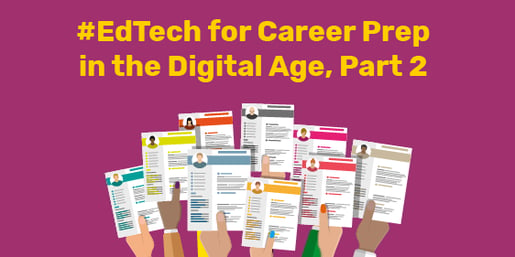
With your university years over, you are facing the end of your traditional education and the start of your career. You are done sitting through classes and handing in academic assignments. No more finals!
Your students have worked so hard to reach this point. And they’ve spent a fair amount of time researching their career options. Did they do all they could to maximize relevant work experience while in school? Internships? Career networking? Resume writing, LinkedIn profiling, interview practicing, alumni outreaching, job board searching, cover letter writing. This career entry thing is hard work!
Has your institution done all it could to help them pursue the career and land the job?
This is what education is all about. Transitioning the learner to then practice their craft, use what they’ve learned.
This is the second half of a two-part series on how to help students cross the bridge to employment. In Part 1, we spoke about EdTech that can help students prep for careers through mentorship and coaching, as well as platforms for virtual work experience, where students can do some of the daily tasks of their chosen career in an online micro internship. What other resources are out there to help strengthen their profile and seal the deal?
(Read on.)
How can EdTech help your institution?
First, let’s give a little context about what is happening with resume’s and how recruiters look at them. Work experience counts. But research shows that there are significant biases in the resume evaluation process.
Some major companies, finding that their traditional hiring practices were perpetuating a white male employee pool, have done away with resumes and anything that identifies the name, gender and other personal characteristics from the initial applicant screening process. Called blind recruiting, applicants’ research and work experience is evaluated with no identifying information to remove biases from the hiring team’s process. It has made a difference and opened some eyes. See this Fast Company story from March 2016.
But not all employers are on board with blind recruiting, so the traditional cover letter, resume and personal connections still count for a lot. Who you know and how you know them is still really valuable when trying to get in the door. A range of online tools are helping your students build a stronger resume and make important connections.
What help is out there?
One company making a big slash in the job seeking world is Handshake, with more than 14 million students and young alumni users and 700+ university career centers paired with more than 300,000 employers, ranging from Mom and Pop companies to those in the Fortune 500.
What is special about Handshake? This service aims to democratize opportunity, “because building your career shouldn’t depend on where you go to school, what you’re majoring in, or who your parents know,” says their website.
Now, for universities, they promise to “supercharge student and employer engagement, strengthen student engagement, bring more employers to campus, leverage data to demonstrate results.”
In concrete terms, they say that with Handshake, most institutions will see a two to three times increase of relevant job opportunities for students within the first six months.
Their platform offers:
- A database of student status/needs/internship and job destinations
- Digital invitations and built-in social sharing of networking and career events
- Career fair planning and processing tools
- Building and room management tools
- Job posting dashboards with personalized student algorithms
- Student appointment managers with reminders and calendar integrations
- Contact management
- Advanced reporting tools
Handshake’s growth has been rapid over the past few years and they have seen significant venture capital investment but has yet to turn a profit. Their value to students, universities and employers seem strong and they are getting past some of their growing pains. We hope they continue to add great features to the platform and get to profitability quickly.
Last week, we spoke about micro virtual internships, but what about when your students want to find one in the real world? For that, there’s WayUp, which offers internships and entry level jobs from more than 20,000 employers—with everything from startups to again those in the Fortune 500. They also offer college and career advice based on level and area of study.
Another option is AfterCollege, which uses artificial intelligence to craft personalized entry-level jobs and internships. They boast 400,000 listings from 25,000 different companies and that they have 2,970 schools as registered users. Students start by entering their school, major, and graduation date, and then build a profile that is a showcase for their relevant experience with projects, applications, blog posts, etc. The AfterCollege system recommends jobs that match student profiles.
What’s Next?
New EdTech options to support your students as they prepare for, and enter, the job market seem to be popping up each month. Some require a subscription fee for universities to use. Others are free to institutions and their students and make money off the employers looking for their next hires.
These match-making services will continue to evolve and give a combination of personal and automated career advice and support. And that advice and support can alleviate the level of effort required by stretched university career services departments.
The successes of your graduates is a huge selling point to your future students. Giving your grads every career opportunity possible once they’ve completed all that classwork is so important to your institution’s success and standing. The platforms we’ve reviewed with this post and Part 1 last week should get your team talking about what truly moves the needle for your students and how you can make their career moves successful.
A new school year is about to start. Let’s be sure, come May, that your graduates are standing tall in the job market. There’s no time to lose.


